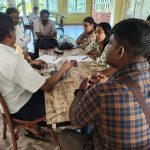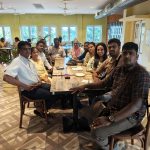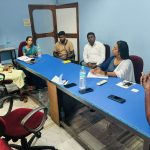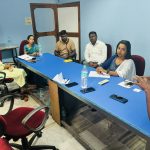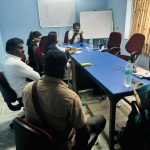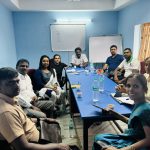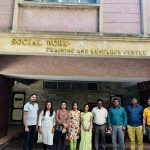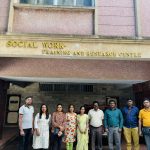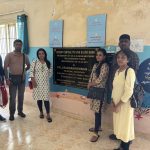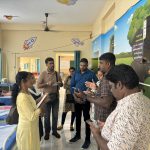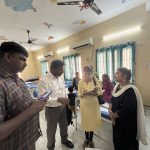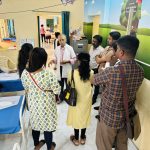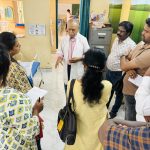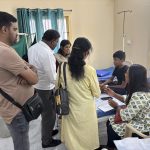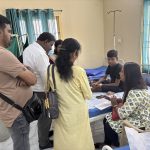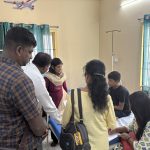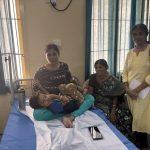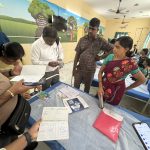From November 1st to 5th, a national-level capacity-building program and exposure visit for ‘Mitigation of Thalassemia, caring for the neglected and the helpless’ programme officers was held in Chennai, India, funded by Misereor. The program brought together seven participants, including three staff members from the National Centre and four diocesan staff members from Badulla, Chilaw, Kurunegala, and Batticaloa dioceses. This visit was organised to deepen participants’ understanding of the challenges, benefits, and rights associated with families of Thalassemia patients, drawing parallels with Sri Lankan realities. It also focused on acquiring knowledge of tools, techniques, and best practices used in India to mitigate and minimize the impact of Thalassemia. Participants explored strategies for educating parents and family members to take proactive roles in supporting Thalassemia patients and overcoming societal pressures, as well as approaches to foster collaboration with stakeholders, particularly government officials, as exemplified by Indian Thalassemia organizations.
The program featured a range of resource persons, including Mr L. Lobithas, Disability and Development Consultant; Ms Mumtaj Suriya, a High Court Lawyer, Thalassemia patient, and activist; Ms Manjula, Manager of the Thalassemia Association of Tamil Nadu; Dr. Revathi Raj, Senior Consultant in Pediatric hematology-oncology at Apollo Cancer Centre; and Dr. Venkanda Deskalanu, a Hematologist at Voluntary Health Services. Their expertise gave participants a comprehensive understanding of Thalassemia care, advocacy, and patient support systems in India.
Over the four days, participants gained diverse insights into Thalassemia management in the state of Tamil Nadu. On the first day, Mr. Lobithas provided an overview of Thalassemia and its inclusion under India’s Disability Act, significantly enhancing patient rights and access to services. Ms. Mumtaj Suriya shared her inspiring life journey, highlighting the power of resilience, self-advocacy, and community support in overcoming the challenges of living with Thalassemia. The second day delved into advocacy strategies and the current living conditions of Thalassemia patients. Discussions centered on key challenges, such as access to specialized care and the importance of continuous medical treatment, while emphasizing practical adaptations for Sri Lanka.
On the third day, participants met with officers from the Social Care Services Department of the State Commissioner for the Differently Abled, who explained how Thalassemia is managed under India’s Disability Act through a multi-stakeholder approach involving the government and NGOs. The team visited the Voluntary Health Services Hospital, where they interacted with patients and families, gaining firsthand insights into the socio-economic and medical challenges faced by Thalassemia patients. The fourth day featured a session with Dr. Revathi Raj, who shared her expertise on advanced medical facilities, treatments, and the use of technology in Thalassemia care. She also discussed on how Bone Marrow Transplantation is a potential cure, highlighting the need for specialized infrastructure.
The visit highlighted the significant benefits of recognizing Thalassemia under India’s Disability Act, which facilitates access to healthcare, financial assistance, and social services while reducing stigma. In comparison, Sri Lanka, though equipped with an established blood transfusion system, faces gaps in managing iron overload and lacks comprehensive, holistic care models. Lessons from India, such as the integration of medical, psychological, and community support, offer a blueprint for addressing these gaps in Sri Lanka.
The program concluded with actionable recommendations to enhance Thalassemia care in Sri Lanka. Participants proposed debriefing sessions to share insights with local stakeholders, the establishment of a National Thalassemia Association to advocate for patient rights, and the adaptation of Indian practices to improve access to healthcare and support. Emphasis was placed on promoting collaboration between government and NGOs, prioritizing accessible healthcare, subsidized medication, regular screenings, and counselling services to enhance the quality of life for Thalassemia patients in Sri Lanka. This exposure visit highlighted the potential for transformative change through inclusive, and collaborative strategies.







